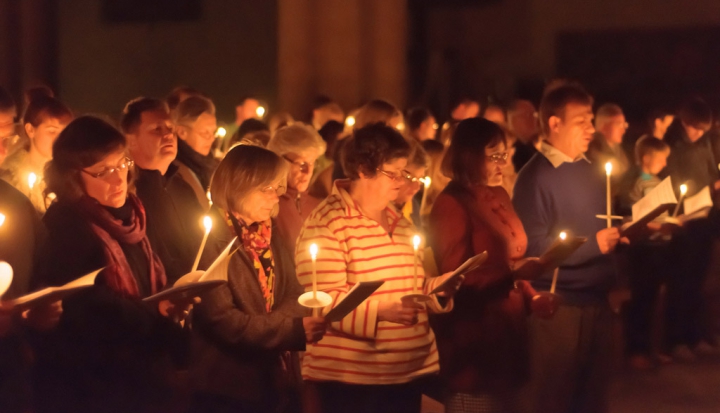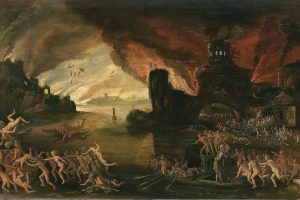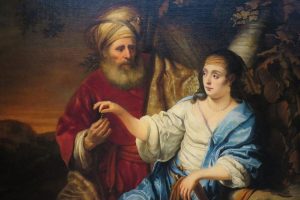Nearly every human being has experienced at least one intensely significant moment in life. The relative infrequency and the fleeting nature of these moments bothers us. And so a very natural desire arises: How can I capture these moments? How can I eternalize a temporal event?
The events recounted in the Book of Exodus reflect one such attempt of the Hebrew community to make historical events take on meaning. The Hebrews were a soulful people; they were not interested in simply handing down bare facts but were concerned more with transmitting the meaning of these events. Most historians agree that an alien people were once slaves in Egypt; that fact is a part of history. However, a Hebrew would ask, what does that fact mean?
If that is the mindset that produced the Book of Exodus, that is the mindset the modern reader needs to adopt to obtain the most from reflection on his work. As Christians, we tend to see added meaning in many passages because we interpret them in the light of Jesus and 2000 years of Christian tradition. There is nothing wrong with that, but it is equally important to give credit where it is due, which is to say that without the prior Jewish experience the Christian experience would have been impossible.
The basic storyline of Exodus is very simple: One man senses within himself the rumblings of a longing for a truly human and free existence; he shares this experience with a whole community so that his vision as leader becomes the vision of the community. The primary experience of those Hebrews was so dramatic that it has become a symbol for meaning and freedom in life.
The Book of Exodus opens with a painful account of the Hebrews’ oppression in Egypt and then, in the second chapter, directs our attention to the individual who will change the situation. The author wants us to be aware of two facts of great importance: First, from birth Moses is set apart for a special task and is providentially saved and cared for (ironically, by the very people whose position he will undermine). Second, Moses is a man of great passion and sensitivity. With those characteristics, the stage is set for his call.
God calls Moses in the burning-bush scene. This story in the third chapter combines the typical Hebrew balance between divine transcendence and immanence. God deals with people but also indicates his sovereignty over them. The revelation to Moses of the divine name can be classed in either category, depending on how one interprets the name. If God is truly disclosing his identity, we are face to face with an occurrence of the deepest intimacy. If, on the other hand, Yahweh (“I Am Who Am”) is merely a put-off, we are witnessing an example of God’s desire to remind people once more of their “otherness.” Whatever the case, this passage asks us to recall that God is involved in human affairs but that he also refuses to be manipulated by us or our affairs.
Plagues and Passover
In the call of Moses we see a man who would rather not be called. Moses offers excuses, but Yahweh will not hear of them. Once Moses accepts the inevitability of his election and takes on his new vocation, we never again see the weak, bumbling individual we meet at the burning bush. Yahweh has become his strength and Moses now takes his place among the type of leaders we refer to as charismatic. He has verve, courage, conviction, steadfastness.
Chapters 5 and 11 depict Moses’ many encounters with the Pharaoh and the ever-increasing seriousness of the divine punishments visited upon the Egyptians because of their leader’s obduracy. Many modern scripture scholars point out that the various plagues can be adequately explained by natural phenomena in Egypt at that time. While this may be true (and much of it is undoubtedly so), for the Hebrews these visitations on the Egyptians were perceived as an answer to prayer. The Hebrews believed that God acted through nature and nature acted only in accord with God’s will. Therefore, our concern is not whether these plagues were natural but whether or not God acted through these events to convince the Pharaoh of his foolhardiness in further detaining the Hebrews.
Exodus 12 tells the story of the first Passover meal. It is necessary reading for an appreciation of the seder supper and the Christian Eucharist. To a Jew, a meal is sacred; through a meal we not only receive physical sustenance but enjoy the company of relatives and friends. Thus, a meal is as important psychologically as it is physically. The seder has served as a focal point of Jewish religious observance as well as for personal and community identity for Jews ever since that first Passover night. As a nation, the Hebrews came alive that night by being bound to God and to each other in a unique and intimate relationship unparalleled in human history. The active remembrance of that event has seen Jews through some of the most terrifying occurrences, for they have known in the most profound way that God was working on their behalf.
The pillar of fire
As the Hebrews prepare to leave the land of their enslavement (Chapter 13 and 14), they come to the Red Sea or, to be more proper, the Sea of Reeds. Once again, they see the hand of God operating in nature as they pass dryshod through the sea. Paradoxically, the body of water which saves the Hebrews and guarantees their freedom is the same body which destroys the Egyptians. Is another natural explanation possible? Yes. Have we thereby eliminatied another miracle? No, because God is the Lord of nature who cares for his people. This passage to safety is immortalized in the canticle of Moses in Chapter 15 where the Lord is acclaimed as gloriously triumphant. No credit is given to Israel for cleverness, resourcefulness, or military acumen; they are the recipients of divine favor, pure and simple.
As the narrative continues, there is other evidence of divine providence: quail, manna, and water. The God of the Hebrews is not aloof or capricious; he is concerned and involved in the lives of his people. The Hebrews’ complaint to Moses is legitimate and God grants their requests for food. Furthermore, he becomes the very source of their direction as he leads them in the form of a pillar of cloud and fire.
Having wooed Israel in the desert with proofs of his love, Yahweh is now ready to ask Israel for proof of their love. They arrive at Mount Sinai, the place of contact with God. The Lord gives Moses the Decalogue (Chapter 20) not only as a set of commandments to test Israel’s fidelity, but also as a gift. By following this law, happiness will be theirs. If the people have sufficiently appreciated their desert experience, they will take this law to themselves as a very dear gift from a caring and loving God. And so it is that they bind themselves and their descendants to this covenant.
The rest of Exodus is concerned with the priestly nature of this special people, whose very lives are consecrated to Yahweh. The Lord of the universe, present everywhere, chooses to dwell among the Hebrews in a most intimate fashion. Therefore, great attention must be given to the symbols of his abiding presence: the ark of the covenant, the meeting tent, the liturgy, and the priests. These are all ways that God reveals himself to the Israelites. These opportunities to encounter divinity are not petty fetishes but important to the maintenance of the sense of the presence of God once so powerfully experienced on a spring night in a foreign land.
Just as the Jews continue to celebrate the Passover meal as a ritual reenactment of the events of their salvation, Christians also ritualize their experience of salvation in Christ. For Catholics, the Easter Vigil is the height of the celebration. The reading from Exodus of the Hebrews’ passage through the Red Sea is part of the Easter Vigil. A reflection on the Easter Vigil, then, is a profitable way for the Christians to participate in the Exodus.
Silent symbols
The Easter Vigil liturgy is the liturgical event of the Christian calendar; it is the celebration to which all other Christian celebrations are ultimately linked. In it we remember Jesus’ personal exodus and also anticipate our own. The beauty and power of this liturgy is not found in the right words or in the correct explanation but in the experience of the event. Symbols appeal to the senses and only secondarily to the intellect. Darkness, light, water, oil, incense, flowers, and music are powerful communicators; they speak directly to the hearts of all people. In an age of verbal overkill and word pollution, it is refreshing to be offered an opportunity such as this:
As I enter the church tonight, it is dark. The man in whom I believed is dead. But, hoping against hope, I keep vigil. Like the Hebrews of old, I am reminded of how cold and loveless life is without God. I wait for him to save me from the slavery of sin and selfishness. The darkness is all-encompassing. There may be a thousand other people here with me but I do not see them; they only present themselves to me as a feeling—and a negative one at that: They are breathing, they are hot, they are restless. And so am I.
All of a sudden, a single lighted candle is introduced into the darkness. These “presences” around me now take shape and gradually assume a human identity. Christ the Light of the world is risen! He has accomplished this feat of making me appreciate these “presences” as persons. Gradually, this column of fire makes its way up the aisle and each of us takes some of his fire to ourselves. In a matter of minutes, what had been a dark tomb is now a blazing furnace of light and warmth and joy.
The cantor assumes his position and chants a hymn in praise of the Light in tones reserved only for this most sacred night. Incense wafts through the air; I lose track of the specifics of the hymn and begin to think back on all the moments in my own life when, like the Hebrews of the canticle, I experienced God’s saving power in a most personal and potent way.
But lest we become too personal, the church presents us with the record of salvation. We stand in a long line of faithful and redeemed people; ours is a proud tradition of men and women who heard the Word of God and put it into practice. We hear of how an oppressed people was freed from bondage because they trusted in God, and we hear of how the most faithful man who ever lived had his fidelity rewarded with the gift of new life.
Many years ago my parents and godparents spoke on my behalf and committed me to a following of this man and to membership in his church. Tonight others are coming to him.
As I watch the baptism, the infants remind me that God loves me before I can ever return that love; he does not require degrees in theology but only the openness of a baby who is receptive to his love. The adults present challenge me to rededicate myself and my talents to serve the Lord of life with deeds of love and mercy.
The community once more turns to its past as a source of strength for present and future. “Holy Mary, Mother of God.” “Pray for us.” “St. Joseph.” “Pray for us.” “All holy men and women of God.” “Pray for us.” I cannot be faithful to the covenant on my own; I need help, I need support, I need the example and prayers of others.
Now the priest prays that the Spirit will descend into the waters of this font to be a source of holiness for all who approach these waters with faith that they, like the Hebrews of old, may pass through them and not experience death but a new, better, and freer way of life. It is hard to give up old ways but tonight we recall that leaving behind excess baggage and being a pilgrim people can lead one to the experience of freedom and to a “land flowing with milk and honey.”
The liturgy moves apace as the old, familiar rites continue. But these prayers never become stagnant; they retain all their meaning and beauty because enshrined in these rites is the Exodus experience of the Jews and of Jesus. I remember the death and resurrection of Jesus in a living, dynamic way. It is no saccharine or sentimental recollection but a memory so key to my identity and that of this community with which I am worshiping that I enter into these events. The paschal mystery happens all over again for me, and I am asked to respond by offering my life in union with Christ.
Praise the Lord!
The Hebrews encountered God in fire, on a mountain, and in nature; they localized his presence in the ark and in the Temple. But never did they begin to think of him as dwelling within them, literally. As a Christian, not only dare I think this but my faith requires me to believe this: God in Christ is within me, sharing his love and his new life. The bread from heaven, the new Manna, fills me with joy and a deep awareness that God never ceases to care for his own.
Throughout the events of this night, I have been bombarded with reminders of the presence of God. Like the Israelites, I need to share this experience with others. I must continuously celebrate this night with other people redeemed by the blood of the Lamb and so gain the strength and courage necessary to pass on the Good News of this night to all I meet. The Lord has conquered sin and death and brought us to life.
One word keeps ringing in my ears tonight, and I wonder if the church has gone mad with this incessant cry, but there is really no better word to summarize my true feelings: Alleluia, Praise the Lord!
In company with all the saints, both past and present, I unite my voice to theirs and say:
“Yes, we praise you, Lord, and we thank you because you have raised Jesus from death to life. May our worship and the faith which is expressed in the prayers we pray, the incense we offer, the songs we sing, the flowers and gifts we bring all serve as a welcome for one who has come back from the dead.”
This article appeared in the April 1979 issue of U.S. Catholic (Vol. 44, No. 4, pages 36-40).
Image: Flickr photo cc by photoverulam













Add comment